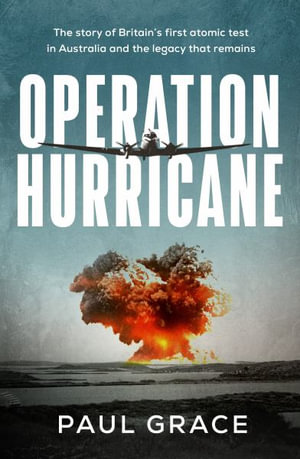Operation Hurricane by Paul Grace

Operation Hurricane by Paul Grace is a powerful account of Britain’s first atomic test in Australia. Grace unpacks the logistics of the mission, from transporting plutonium in steel boxes welded shut to RAAF patrols sweeping the skies to the bomb being lowered into a warship. But beneath the technical feat lies the sobering reality of the environmental damage and the harm suffered by Indigenous communities exposed to radioactive fallout with little understanding or protection.
A major thread running through Operation Hurricane is Britain’s imperial arrogance and Australia’s political compliance. Grace emphasises Britain’s assumption that Australia would serve as its nuclear testing ground with minimal consultation or concern for long-term consequences. He highlights how PM Menzies approved the operation without parliamentary discussion, thereby framing Australia as the associate in an extremely dangerous experiment. He also draws the reader’s attention to the physical and biological scars left behind by the experiment, bringing to light how fallout drifted far beyond the blast zone, irradiating islands and seeping into the mainland, how servicemen were unaware of the dangers, and how Aboriginal communities living closest to the land suffered the most, yet remained invisible in planning.
Although Operation Hurricane is a historical account, Grace brings it to life through the voices of those who lived it. Drawing on his grandfather’s experience in the RAAF, he offers a personal lens, adding depth and emotional weight to the story. The inclusion of testimonies from servicemen like Vince Douglas, who witnessed the detonation firsthand, makes the narrative gripping and real. Meanwhile, the decision-makers, both British and Australian, are portrayed with detachment, highlighting the distance between those giving orders and those facing the consequences. Most notably, the near-absence of Indigenous voices becomes a haunting omission that underscores how these communities were sidelined both in history and in reality.
Operation Hurricane is a wake-up call. Grace manages to take something technical and historically dense and make it genuinely compelling to his readers. His writing is accessible without dumbing anything down, and the way he weaves personal stories into broader political critique is incredibly effective. Readers are made to find themselves frustrated, rightly so, by the recklessness of the operation and the way Australia was treated as a nuclear testing ground without question. The book raises some hard questions: Who gets to write history and who gets forgotten? And what do we owe those who were affected?
Themes: Atomic bomb testing.
Jyotsna B. (Student)